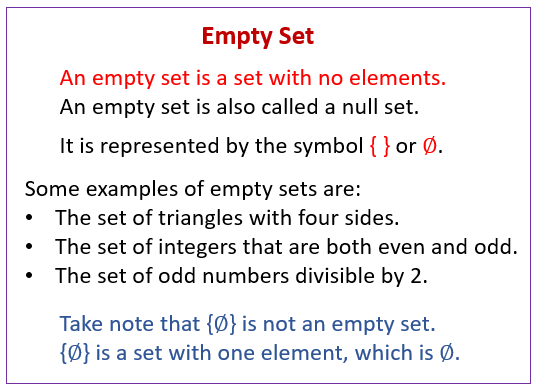The Empty Set And Set Equality
In these lessons, we will learn how to define sets, the empty set, equal sets, subset, superset, proper subset and proper superset.
Related Pages
Describing Sets
Venn Diagrams
More Lessons On Sets
| Sets & Set Notations | ||
|---|---|---|
| Empty Sets | Equal Sets | Set Worksheets |
How To Define Sets And Elements?
A set is composed of elements or members. A set is denoted by capital letters.
A = {a, b, c, d}, a ∈ A, a belongs to A
B = {e, f, g, h}, a ∉ B
A set can be defined in the following ways:
- Listing all the elements, A = {a, b, c, d}
- Describing the properties held by the members
A = {first 4 letters of the alphabet}
This video introduces the concept of a set and various methods for defining sets.
The Null Set Or Empty Set
The following diagram explains what is an empty set and gives some examples. Scroll down the page for more examples and solutions.

There are some sets that do not contain any element at all. For example, the set of months with 32 days. We call a set with no elements the null or empty set. It is represented by the symbol { } or Ø.
Some examples of null sets are:
The set of dogs with six legs.
The set of squares with 5 sides.
The set of cars with 200 doors.
The set of integers which are both even and odd.
Try out the following worksheet to test whether you know if a set is finite, infinite or empty.
Sets Worksheet
Set Equality
What Are Equal Sets?
Consider the sets:
P = {Tom, Dick, Harry, John}
Q = {Dick, Harry, John, Tom}
Since P and Q contain exactly the same number of members and the members are the same, we say that P is equal to Q, and we write P = Q. The order in which the members appear in the set is not important.
Consider the sets:
R = {2, 4, 6, 8}
S = {2, 4, 6, 8, 10}
Since R and S do not contain exactly the same members, we say that R is not equal to S and we write R ≠ S.
See the following lesson about equal sets
Key Properties of the Empty Set:
- The empty set has zero elements. Its size (cardinality) is 0.
- The empty set is a subset of every set, including itself.
- The union of the empty set with any set A is A:
A∪∅=A - The intersection of the empty set with any set A is the empty set:
A∩∅=∅ - The complement of the empty set is the universal set.
How Sets Can Be Related To Each Other In Different Ways?
This video describes the set relations of equality, subset, superset, proper subset, and proper superset.
How To Use Venn Diagrams To Show Relationship Between Sets And Set Operations?
A Venn diagram is a visual diagram that shows the relationship of sets with one another. The set of all elements being considered is called the universal set (U) and is represented by a rectangle. Subsets of the universal set are represented by ovals within the rectangle.
The complement of A, A’, is the set of elements in U that is not in A.
Sets are disjoint if they do not share any elements.
The intersection of A and B is the set of elements in both set A and set B.
The union of A and B is the set of elements in either set A or set B or both.
Try the free Mathway calculator and
problem solver below to practice various math topics. Try the given examples, or type in your own
problem and check your answer with the step-by-step explanations.

We welcome your feedback, comments and questions about this site or page. Please submit your feedback or enquiries via our Feedback page.